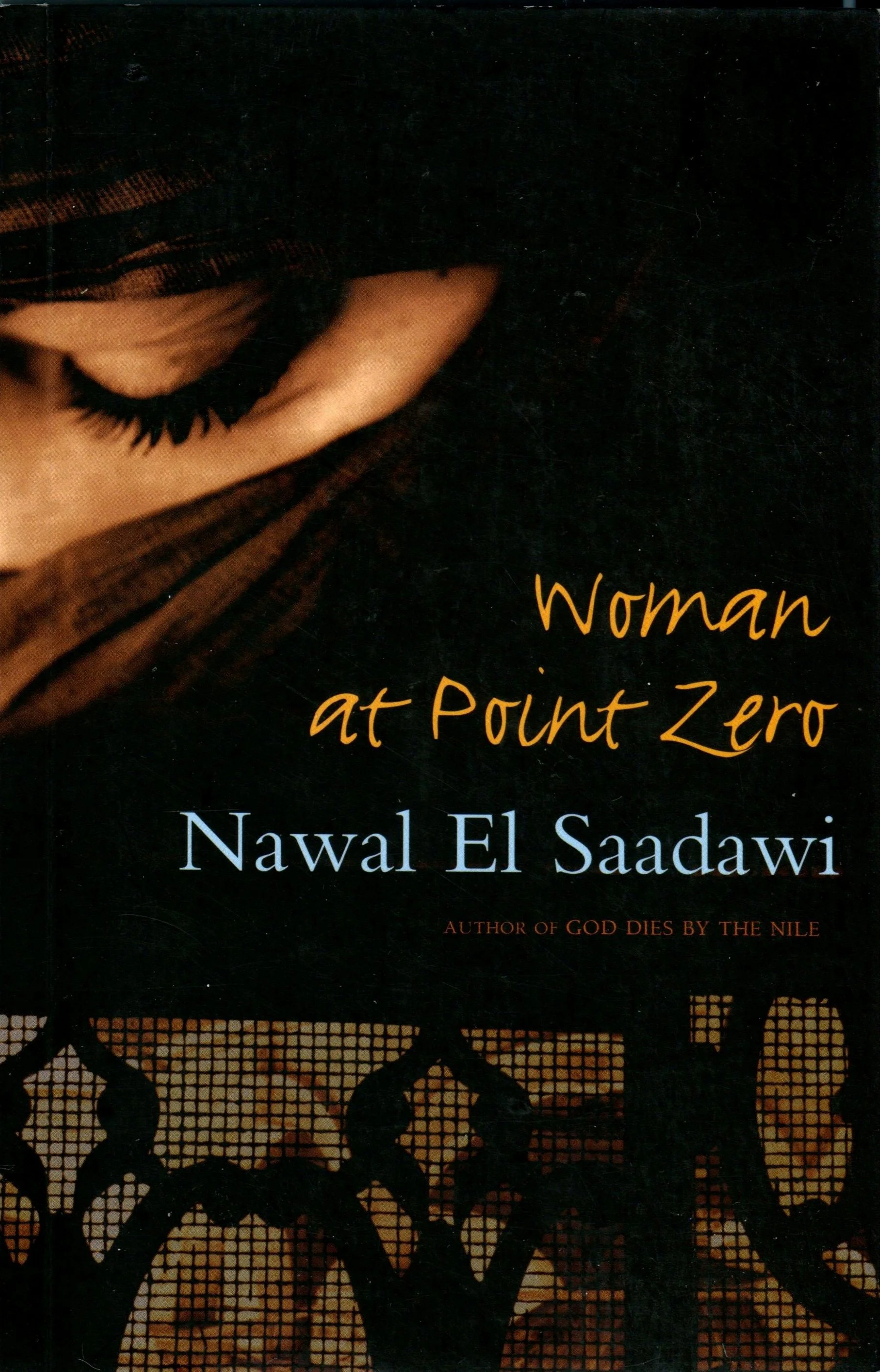Egypt: Woman at Point Zero (Nawal El Saadawi, trans. Sherif Hetata)
Nawal El Saaawi (b. 1931) is an Egyptian writer, psychiatrist, and activist. She was educated and studied Arabic, and completed medical school at Cairo University. As a physician, her work and interest concentrated on women, and their suffering under oppression from sexism, classism, and tradition. She eventually rose to become Director of Ministry of Public Health, although she was fired after publishing Woman and Sex, a book focusing on violence against women’s bodies. She began to focus her research on neurosis in women, and eventually helped to publish a feminist magazine called Confrontation. This led to her imprisonment by President Anwar Sadat. Upon her release, persecution forced her to leave Egypt in 1988. She accepted a teaching position at Duke University, but has since worked at a number of prestigious institutions across the USA before moving back to Egypt in 1996. She has continued to work as an activist since, and has received many awards for her work, including the North-South Prize by the Council of Europe. (She’s just a really badass lady and I highly recommend reading more about her!)
Background: While settlement in Egypt dates back more than 12,000 years, a unified kingdom began to emerge around 3150 BC, which eventually led to a 3000 year dynasty, familiar to many through hieroglyphs, pyramids, and mummies. During this period, certain pharaohs were more and less successful in projecting their power, with c.1550-1070 BC as the period of greatest growth. In 525 BC, the Achaemenid Persians began to conquer Egypt ruling until they were later defeated by Alexander the Great, whose founded the Ptolemaic dynasty. The last of these was Cleopatra VII. Rebellion from native Egyptians, and later annexation by Rome led to the downfall of the large-scale dynasty. Christianity was brought to Egypt in the 1st century AD, and Egyptian power was transferred to the Byzantines. Although the Byzantines lost power to the Persians briefly in the 7th century, they managed to hang on until the Muslim Arab invasion in 639-42, and Sunni Islam was introduced. For six centuries, Muslim rulers remained in power, until the Plague killed off about 40% of the population in the mid-14th century. In 1517, the Ottoman Turks conquered, and the region was severely weakened. Portuguese trade flourished, and famine was rampant. Egypt tried to establish some amount of autonomy, but in 1798, Napoleon invaded. When France was defeated, the Ottomans, Egyptian Muslims, and Albanians vied for power. The Albanians were successful, and the dynasty established then lasted until 1952, although the British began to exert control as well in the later part of the 19th century. From 1882-1952, the area was declared a British protectorate. Nationalism was brewing, though, and in 1919, the first Egyptian revolution took place, which led to a declaration of independence in 1922. After another revolution in 1952 in an effort to shake off the last of British influence, Egypt became a republic, although military rule, war, and economic instability threatened. Upon the appointment of Anwar Sadat to the presidency, attempts were made to modernize the country, also opposition was also strongly put down. When Sadat was assassinated, Hosni Mubarak came to power. Faced with poverty, terrorism, and economic difficulties, Mubarak attempted to improve things, although his government was increasingly corrupt, and turned to torture and other human rights abuses. In 2011, protest against the government began in earnest, resulting the Mubarak’s resignation. The military took over, getting rid of parliament until the appointment of Muhamed Morsi, although his political choices also drew criticism and protest throughout Egypt. Morsi was ousted by the military in 2013, and in 2014 a new constitution was put in place with Abdel Fattah el-Sisi as President.
Woman at Point Zero is a short but cutting novel based upon an encounter El Saadawi had with a prisoner at the Qanatir Women’s Prison. The novel tells of a psychiatrist (essentially El Saadawi herself) listening to the story of this woman’s life before she is sentenced to death. Firdaus, the woman, is confusing to those around her due to her stone-faced behavior despite her sentence. Firdaus eventually begins to reiterate her story, telling of her impoverished childhood, the abuse of her father, her genital mutilation, and her molestation at the hands of an uncle. Eventually her parents both die, and she goes to live with her uncle who educates her. Without giving too much away, Firdaus describes her various experiences attempting to attain personal freedom, her changing relationship to prostitution, and how her experiences with men continue to shape her views of herself and men. Firdaus is profoundly tough; her strength in the face of the terrors of her life is mind-boggling, and intensity of her conviction and self-reflections makes it impossible to put down the book. I applaud El Saadawi for putting this woman’s story to paper, although there is always the question of the weirdness of making money off someone else’s account. At the same time, El Saadawi herself has certainly suffered for her work. This is feminist literature, no doubt. If you’re a male apologist, you’re not going to like it. This book (and El Saadawi herself) is quite critical of much of what the West tries to forgive in traditional Muslim society: she is against FGM, capitalism, religious fundamentalism, the wearing of the veil. While the left-wing (at least in the US) generally tries to accept some of these, it is certainly interesting to read a Muslim woman’s criticism of such practices. Does she get the final word? Or course not, but it is probably a perspective worth exploring, too. A firebrand of a novel; should be required reading.






